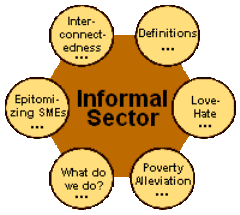

Formalize the Informal Sector
Indian economy is said to be oiled by the informal or unorganized sector. This sector provides support to the organized sector in the form of supplies and logistics. To that end, its importance cannot be discounted. This sector is extremely cash dependent and has been hit hard by demonetization. But it also has to be recognized that there is a very thin line between being informal or unorganized and being illegal. By Sunil Garodia
First publised on 2017-01-09 17:58:39
There is no harm if one conducts business in cash, as long as all transactions are accounted for in books of accounts, transactions are carried out through purchase and sales invoices, relevant taxes are paid, returns are filed and no laws of the nation are broken. If any of the foregoing is not adhered to, then the business is operating illegally. With several restrictions in place for payment in cash, it is clear that most of the informal sector units operate illegally. In that case, the importance it holds to the organized economy is immaterial the said businesses must adopt legal means or close down.
Apart from causing huge revenue loss to the nation by not paying taxes, these businesses are guilty of providing unfair competition to those entrepreneurs who operate legally. Since they pay no taxes, source their raw materials from the underground market and pay labour wages at much reduced rates, these units can supply at a much lesser cost than those who operate by sticking to the law. If these units are not brought in line, it will continue to act as a disincentive for small entrepreneurs to operate legal businesses. After all, how long can a businessman tolerate loss of orders and reduced profitability by operating legally when he sees illegal units mint money?
If demonetization has hit these units hard, as a follow up, the government must do all to ensure that they enter the mainstream. Continued evasion of taxes is hurting the nation. The government should expand banking services and ensure that these units shift to transactions through banking channels. Cash leaves no trail and doing business in cash makes it easy to avoid paying taxes. This state of affairs cannot be allowed to be continued any longer. Unscrupulous businessmen continue to live a life of luxury by robbing the nation of its rightful share of taxes. For the informal sector, not less-cash but no-cash should be the mantra.











